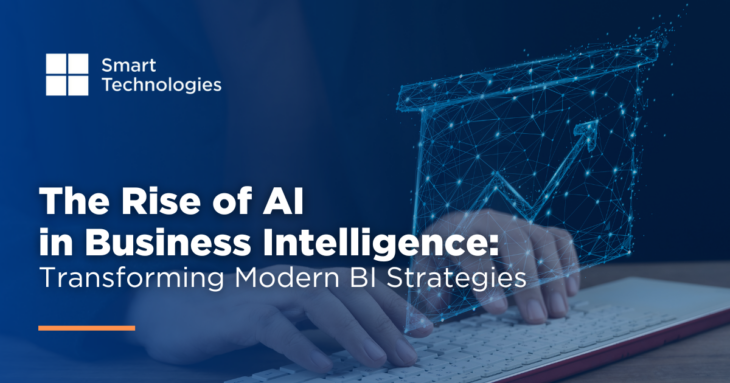
- April 22 2025
- Smart Technologies Ltd
In today’s data-driven world, artificial intelligence (AI) is revolutionising Business Intelligence (BI). Companies are leveraging AI to automate analytics, extract deeper insights, and drive smarter decision-making. As AI continues to reshape BI, understanding its impact and potential benefits is crucial for businesses looking to stay ahead.
The Evolution of Business Intelligence
Traditionally, BI relied on structured data, dashboards, and manual analysis to generate insights. While these methods provided value, they were often time-consuming and reactive. AI has transformed BI into a more predictive and automated process, enabling businesses to make data-driven decisions faster and with greater accuracy.
How AI is Transforming Business Intelligence
Automated Data Processing & Analysis
AI-powered BI systems can process vast amounts of structured and unstructured data in real time. By automating data cleaning, aggregation, and visualisation, AI reduces manual efforts, allowing businesses to focus on strategy rather than data preparation.
Predictive Analytics & Forecasting
One of AI’s most powerful contributions to BI is predictive analytics. Machine learning algorithms identify patterns, trends, and anomalies, helping businesses anticipate future outcomes and optimise strategies for better results.
Natural Language Processing (NLP) for Data Interaction
AI-driven NLP enables users to interact with BI tools using natural language queries. Instead of navigating complex dashboards, business users can simply ask questions and receive instant, meaningful insights.
AI-Powered Decision Support Systems
AI enhances decision-making by providing real-time recommendations based on comprehensive data analysis. These intelligent support systems help businesses move beyond intuition, making data-backed decisions with confidence.
Advanced Data Visualization & Storytelling
AI-powered BI platforms generate intuitive, dynamic data visualisations, making complex data more accessible. Automated reporting streamlines communication, ensuring stakeholders receive actionable insights without manual effort.
Fraud Detection & Risk Management
AI continuously monitors data for anomalies and potential risks, making it invaluable in finance, healthcare, and cybersecurity. Real-time fraud detection helps organisations mitigate threats before they escalate.
Challenges of Implementing AI in BI
While AI-driven BI offers significant benefits, businesses must address key challenges:
- Data Quality & Integration: AI models require clean, well-structured data to perform effectively.
- Skill Gap: Organisations need data scientists and AI specialists to optimize AI-driven BI solutions.
- Privacy & Compliance: Handling sensitive data requires adherence to security regulations and best practices.
- Cost & Infrastructure: Implementing AI in BI may require investment in cloud computing and AI-driven platforms.
The Future of AI in Business Intelligence
AI is evolving rapidly, and its influence on BI will only continue to expand. Key future trends include:
- Augmented Analytics: AI will make data insights more accessible to non-technical users, democratising data analysis.
- Edge Computing & Real-Time Analytics: Faster processing will enable businesses to make instant, data-driven decisions.
- Hyper-Personalisation: AI will customise BI dashboards and reports based on individual user preferences and behaviour.
Conclusion
AI is revolutionising Business Intelligence, enabling businesses to gain deeper insights, enhance efficiency, and drive smarter decision-making. However, successful AI integration requires overcoming data, skill, and infrastructure challenges. As AI technology advances, its role in BI will become even more transformative, shaping the future of data-driven strategy and innovation.
By staying ahead of AI trends and leveraging its capabilities, businesses can unlock the full potential of data-driven decision-making and maintain a competitive edge in an increasingly digital world.